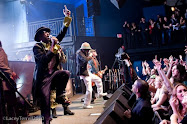 Explosive!
Explosive!Molotov had separated, or so many were led believe. For much of 2007, the irreverent /rap/political/party/English/Spanish Mexico City band's Web site had little to say to refute or confirm the rumors, and their legions of fans from the Americas and Europe were left wondering if it was true. To add to the mystery, each of the group's four members released their own individual EPs in a self-proclaimed battle of the bands with fans voting for best song. But then in October, in typical sarcastic Molotov fashion, the band released "Eternamiente"—the translation a mix of eternal ("eternamente") and lie ("miente") — an album that combined these EPs."Ha, we were just messing with the industry, man," said bassist Paco Ayala from his Mexico D.F. home. "We really needed to separate so we can become isolated, to really focus on what themes we each wanted to cover. Each of us added our own flavor to the mix, and we're excited about the results of this experiment." Indeed. Molotov has never been afraid to push the envelope and has been one of the most eclectic rock bands ever to come out of Mexico since its 1997 debut "Dónde Jugarán Las Niñas." Lyrics critiquing the oppressive paternalism of the Mexican government, explicit sexual themes and raunchy lyrics (as well as a racy album cover of a Catholic school girl in a hiked up short skirt) almost got them banne d from Mexico, and caused them to move to Spain for a short time. Hence the many comparisons to our Rage Against the Machine. They've also been compared to the Beastie Boys and the Red Hot Chili Peppers for their funk rhythms, booming bass rifts and controversial issues. The country has progressed since then and has become more accepting of their native sons, even if one member is originally from the U.S. — Louisiana-born drummer Randy "El Crazy Gringo" Ebright, son of a top-flight DEA agent in Mexico D.F. who is just happy his son is still alive at this point. Tito Fuentes is technically the lead singer/guitarist, but all four members contribute.Although their hits have incredibly catchy, head-bobbing and mosh pit-inducing beats, many are far more than just party songs. "Gimme Tha Power" stands up for the disenfranchised within Mexico ("Gimme all the power, so I can come around mess with someone"). "El Carnal de las Estrellas" protests the giant television network Televisa's refusal to air their music videos. "Frijolero," the band's biggest hit to date, which earned them one of their two Latin Grammys, decries the migratory problems between Mexico and the U.S. The song has the band portraying U.S. Border Patrol agents in a mocking gringo accent and Mexicans trying to make it across the Rio Grande ("Don't call me gringo, you f***in beaner, stay on your side of the goddamn river… Don't call me beaner, Mr. Masturbator, I'll give you a scare for being a racist and a coward.")Their latest hit "Yofo" is best kn
d from Mexico, and caused them to move to Spain for a short time. Hence the many comparisons to our Rage Against the Machine. They've also been compared to the Beastie Boys and the Red Hot Chili Peppers for their funk rhythms, booming bass rifts and controversial issues. The country has progressed since then and has become more accepting of their native sons, even if one member is originally from the U.S. — Louisiana-born drummer Randy "El Crazy Gringo" Ebright, son of a top-flight DEA agent in Mexico D.F. who is just happy his son is still alive at this point. Tito Fuentes is technically the lead singer/guitarist, but all four members contribute.Although their hits have incredibly catchy, head-bobbing and mosh pit-inducing beats, many are far more than just party songs. "Gimme Tha Power" stands up for the disenfranchised within Mexico ("Gimme all the power, so I can come around mess with someone"). "El Carnal de las Estrellas" protests the giant television network Televisa's refusal to air their music videos. "Frijolero," the band's biggest hit to date, which earned them one of their two Latin Grammys, decries the migratory problems between Mexico and the U.S. The song has the band portraying U.S. Border Patrol agents in a mocking gringo accent and Mexicans trying to make it across the Rio Grande ("Don't call me gringo, you f***in beaner, stay on your side of the goddamn river… Don't call me beaner, Mr. Masturbator, I'll give you a scare for being a racist and a coward.")Their latest hit "Yofo" is best kn own for its whistle-filled, sing-songy chorus "Yofo zafa fofo… alofo nofo cofo cofo!" a Mexican decoded slang not all too dissimilar to Snoop Dogg's "Fo Shizzle, with "yo" meaning "me," but when used in "yofo nofo" is translated into "me… no." While tough to understand or translate at times, their music has transcended language barriers. Molotov is playing predominantly in the heavily Hispanic-populated Southwest for their U.S. Tour, with DC being one of three stops on the East Coast. "We've always loved the diversity of the people in DC — all the different nationalities," said Ayala. "Whether they're Mexican or not, they can get into our punk music, get a little drunk, and have a great time."Molotov performs at the 9:30 Club Feb. 9, doors open at 9 p.m. General admission tickets are $25 and available at www.tickets.com. Information on Molotov available at http://www.molotov.com.mx/ and www.myspace.com/molotovoficial.
own for its whistle-filled, sing-songy chorus "Yofo zafa fofo… alofo nofo cofo cofo!" a Mexican decoded slang not all too dissimilar to Snoop Dogg's "Fo Shizzle, with "yo" meaning "me," but when used in "yofo nofo" is translated into "me… no." While tough to understand or translate at times, their music has transcended language barriers. Molotov is playing predominantly in the heavily Hispanic-populated Southwest for their U.S. Tour, with DC being one of three stops on the East Coast. "We've always loved the diversity of the people in DC — all the different nationalities," said Ayala. "Whether they're Mexican or not, they can get into our punk music, get a little drunk, and have a great time."Molotov performs at the 9:30 Club Feb. 9, doors open at 9 p.m. General admission tickets are $25 and available at www.tickets.com. Information on Molotov available at http://www.molotov.com.mx/ and www.myspace.com/molotovoficial.





























